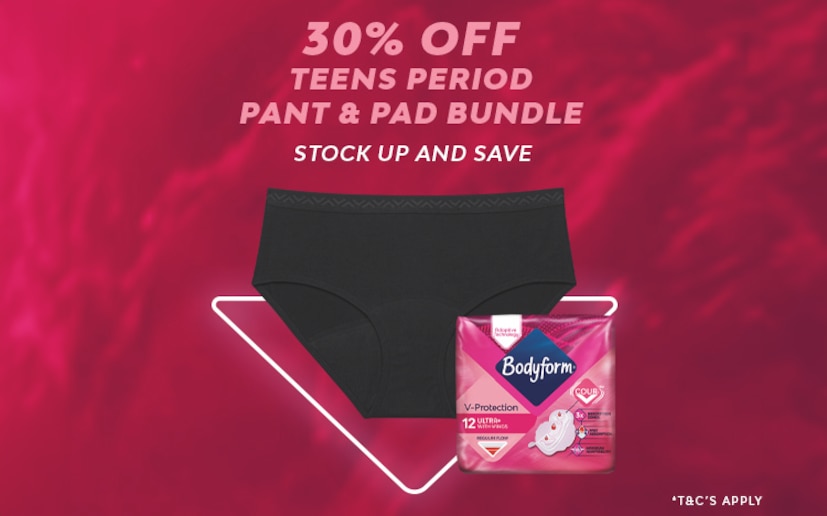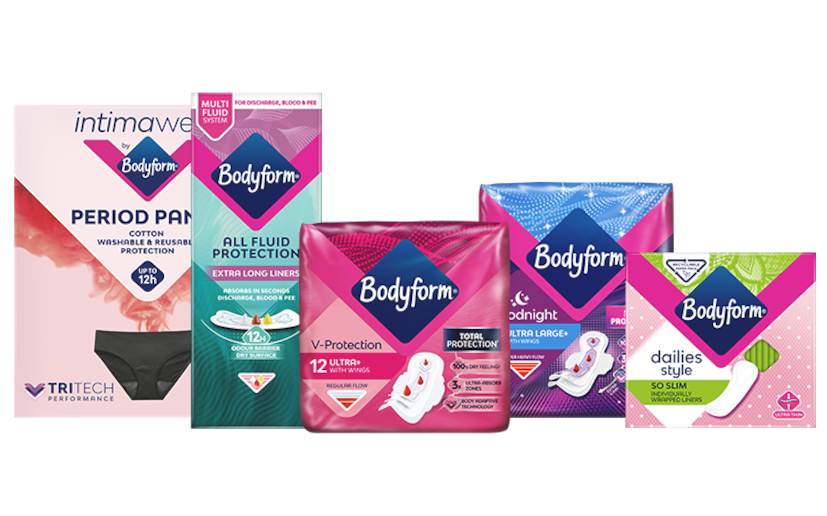The period talk: talking about periods with your child

Is your child showing signs of starting their first period or getting curious about menstruation? It's time for the period talk. Don't worry about saying the right things, as we’ve got you covered with tips on how to talk to your child about all things periods.
Menstruation is a natural part of life and yet we still live in a society that places a lot of shame and stigma around it... it’s no wonder that talking about periods and body changes can be uncomfortable at first. But once you get past that, you’re in for the opportunity to support your teen during a very important time in their life and help them understand what to expect. There’s no perfect way to have this conversation – all you can do is give it a go.
But what if you don’t know where to start? Well, how about starting with yourself? Perhaps you aced every biology class in school, or maybe you weren’t too interested in the works of the menstrual cycle back then. Either way, whatever information you still recall about might be a bit outdated, so it’s a good idea to give yourself a refresher on puberty basics.
From understanding when periods are due to how hormonal changes can affect your child – there is quite a bit to go through. But having all the latest information fresh in your mind may help you answer questions more confidently and speak about periods in a positive light. And hey, you might even learn a new thing or two!
So, let's look at when and how to have the period talk…
When’s the best time for the period talk and when do periods start?
There’s no perfect moment for the period chat but it’s never too early to open up the conversation. Periods usually start between the ages of 11 and 14, but some young people can get theirs as early as 8 or 9, which means you can start even from then.
So how to know when the time is coming? There are some typical puberty signs and symptoms you may want to look out for like breast development, mood swings due to hormonal fluctuations or changes in their body shape. Your child may have even told you that they’ve noticed early signs such as growing pubic hair, feeling some breast tenderness, or that their emotions feel out of control.
When you do notice these or your child mentions them, it’s definitely your chance to get talking. This way, they won't be taken by surprise when first periods arrive and they can begin this new chapter with confidence.
How to have the period talk?
Talking about periods can be intimating — it means your kid is growing, after all! And if you’re not used to talking about periods or haven’t experienced them yourself, it’s common to feel a bit awkward or embarrassed.
You may want to consider splitting the topic into chunks instead of having one long and formal talk. Then you could start by asking what your daughter or son already knows about menstruation. This way you won't get that eye-rolling reaction we all dread.
Why not bring up the topic in natural day-to-day moments too? Imagine you’re sitting on the sofa watching TV with your child, when an ad for period products comes up. This may be the perfect opportunity to talk about what period product would best suit them.
Try using clear and positive language when talking about periods
Having honest conversations should help your child feel comfortable when they start their first period. It’s all in how you frame it. Many of us grew up feeling scared of periods because sometimes they would be called frightening names like ‘red wave’, ‘shark week’, or ‘the curse’.
So it’s best to call things for what they are and keep the language light and positive when having the period talk. By trying to avoid confusion and shame you’ll show your teen that menstruation is a natural part of growing up. This will help them feel comfortable with first periods and puberty overall.
Get support from other adults
Most parent-children relationships are not easy — we all have different personalities and ways to connect. If you sense that your daughter or son is finding it difficult to talk to you about periods, it’s okay to ask for help.
Reaching out to family members such as older siblings, cousins, or aunts and uncles can help them understand periods. It can feel odd to ask for help with your teen’s upbringing but ensuring they get the period talk one way or another comes to show just how much you love them. Also, seeing how these topics are openly talked about among the people they know will help your child embrace periods and could encourage them to discuss other ‘taboo’ subjects they could be curious about.
Explore period products together
Seeing how period products work together is a good way to help your child understand menstruation. You can even make a shopping trip out of it! This way they get to know what’s out there and you can stock them up before they even start – with plenty of period products easily accessible in your home, they will feel more confident and prepared to explore.
Having your teenager try the products you purchased out is a great way to help them get used to them. So why not stick some period pads to underwear just to practice or show them how tampons pop out of the applicator?
If pads and tampons seem too complex or if your child is interested in being kinder to the planet, you may want to give them reusable options like period pants which are made of absorbent material to capture their menstrual flow —which can also save you money in the long run as well as some trips to the supermarket! It can take some time for your teen to decide which period product is right for them but exploring options together is a good way to start, give her sanitary pads or tampons to suit different flows or see if she wants to try out period pants for teens.
It's 'Never Just A Period'. Get comfort and protection for your teen.
Questions your daughter or son might have about first periods
We all know that teens can be curious, so they may have a lot of questions once you open the conversation about periods. Here are a few common worries they might have, with answers to help you support and reassure them.
What colour is period blood?
Well, it can be a few different colours! When teens just start their period journey, their flow can be light pink to light brown. If they experience heavy periods, the blood will tend to be a dark red. And on lighter days, it may be pink or brown. It’s a good idea to remind your child that the colour of period blood can vary from month to month and from one day to the next, what’s important is that they get to know their normal.
Do periods hurt?
Sometimes! Period cramps are a common part of menstrual cycles, but the good news is that there are ways to deal with them. Period pain relief can be as simple as using a hot water bottle, doing some light exercises, or taking over-the-counter pain medication. Just make sure that your teen knows where these items are in your house, and how to use them safely.
The most important thing is to remind your child that although some pain is common, experiencing severe pain on their period is not normal, and they should reach out for help if this happens. If cramps are getting in the way of your child’s daily life, it’s a good idea to take them to the doctor for a check-up. Suspecting something is off can be scary, so reassure them by letting them know that you’re there to support and whatever happens, they won’t have to go through it alone.
Does period blood smell?
Yes! And it’s completely normal for menstrual blood to have a slight smell because of the iron in it.
Remember to let your teen know that it’s also ok for their menstrual blood smell to change slightly from period to period... just like with colour, it’s important that they get acquainted with what’s usual for their body.
What to do about period stains?
Period stains happen every now and again! They’re nothing to be ashamed of and they’re easy to fix if you teach your child how to remove a period blood stain.
But you can help prevent pesky stains by getting your teen the right period pants, sanitary towels, or tampons to suit different levels of menstrual flow – so they'll be ready for anything, even if they experience heavy bleeding. You can also have them keep extra menstrual products in their school bag — whether it’ll be to save the day if they get their first period at school or to help out a classmate.
Can I get pregnant on my first period?
Firstly, try not to freak out. Just because they asked, doesn’t mean your child is already having sex. It’s more likely that they’re curious and trust you as the person who’ll give them the most honest answer. It’s a good idea to remind your teen that anyone who has a uterus and is already having periods can get pregnant at any point.
So, this might be a good moment to chat about having safe and consensual sex or starting contraception with them. Evolving the period talk into the sex talk can be difficult on both sides, but it is important too! So, it’s okay to ask for help from others to get through it.
Can people swim while they’re on their period?
Periods shouldn’t get in the way of doing sports, not even swimming! It’s just a matter of using the right product for it, whether it’s a cup or a tampon. But many people find that tampons are the best choice for beginners, especially when they come with an applicator.
Tampons can be tricky for first-timers so make sure to guide your teen through how to insert a tampon as well as how to remove one, so they can swim away confidently. You may also want to teach and reassure them about Toxic Shock Syndrome (TSS) so they’re not worrying about it.
Puberty is as much of a new adventure for your child as it is for you and it’ll take some time to adjust. Talking to them about first periods can be challenging in the beginning – but it’s like jumping into cold water, once you get past those first few uncomfortable moments, it gets much easier. It may take some trial and error too, so don’t be discouraged if at first you don’t succeed... try again!
And even if your child’s period starts, that doesn’t mean the period talk should stop. The best thing you can do is keep the conversation going. Teens are much more likely to cope with their bodies' changes if they understand them. It’s normal for them to feel nervous about such a new experience but remind them that they don’t have to go through it alone – you’re also there for the ride!
To keep supporting your teen, why not dig into how to talk about puberty or find out more about the ups and downs of living with periods?




